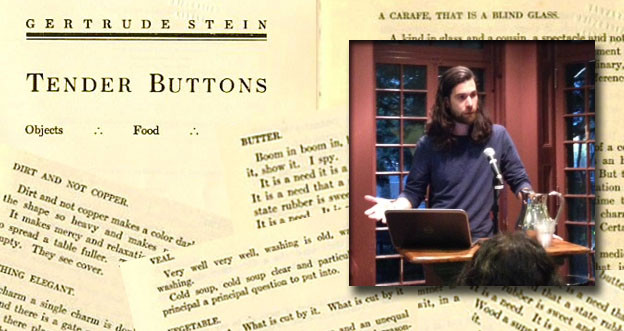What I see in Stein's 'Tender Buttons'

Sitting outside the Pub on Passayunk East in Philadelphia on a recent summer evening talking with poet Ryan Eckes about Gertrude Stein’s Tender Buttons, I tried describing my reading experience of it to him and likened it to closing one’s eyes and seeing the tiny motes that float across them, how while trying to focus on a particular mote, it slips away — that that’s what words and things in Stein’s TB were like, which is to say they’re elusive, and that the book’s meanings, sentence to sentence, unfold in measures of shape-shifting tones, words, and syntax.
The only way, in fact, to see (/catch) the motes without them scurrying away is to look at them aslant, out of the corners of one’s eyes, peripherally. Stein writes at the beginning of “Rooms,”“Act so there is no use in a center.” This notion of de-centering is a theme throughout, and suggests this kind of looking, of seeing things outside of one’s immediate line of sight. Peripheral vision, akin, in my opinion, to a devotional act, is like close listening — it’s a widening of what one is in fact aware of at any given moment. And in this it is a particularly humane and inclusive way of seeing. It fights for the margins, the complexity of the whole, it wants the fringe to be included and given as much weight as what’s at the center. It wants, finally, for there to be no difference between what gets left in or out, because it’s all in. Everything.
Reading Tender Buttons I also find myself thinking of outskirt Proteus, the sea god transmogrifier who, once wrestled with and bound, would (will) give up his oracle, a glimpse into the future. Living on the fringe of the classical world himself in distant Egypt (Homer) or else a secluded sea-washed cave on a far-away island (Vergil), his gifts might be thought of as comparable with Stein’s. Certainly for the reader in 1914 Tender Buttons was no less an outlying augur, what would become a compass for the century’s poetics and thinking — hard to get to or at, maybe, but worth the effort and paying off handsomely for some of those making that effort, themselves too on the outside scribbling, writing their own books in the margins.